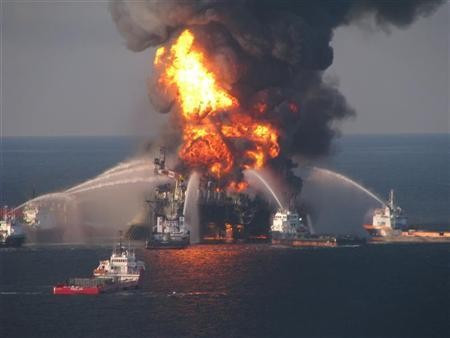Deepwater Horizon Oil Spill: BP Accused of 'Gross Negligence and Wilful Misconduct' by US Government

BP, the British oil giant, has been accused of "gross negligence and wilful misconduct" by the US government in the build-up to the disastrous Deepwater Horizon oil spill that wreaked havoc on the local environment in the Gulf of Mexico and cost billions of dollars to clean up.
It is the latest worded assault by the US Justice Department on BP - the strongest yet - in court papers as government lawyers strive to pin the blame on BP for one of the world's worst ever oil disasters.
A successful gross negligence prosecution under the Clean Water Act could see the civil damages cost to BP soar to $21bn (£13.25bn).
BP stock had fallen in London by 4.16 percent on the day to 418.45 at 09:53 BST.
Since April 20, 2010 when the Deepwater Horizon disaster started BP stock has lost around 35 percent of its value.
"That such a simple, yet fundamental safety-critical test could have been so stunningly, blindingly botches in so many ways, by so many people, demonstrates gross negligence," said the filing to a New Orleans federal court.
"The behaviour, words and actions of these BP executives would not have been tolerated in a middling size company manufacturing dry goods for sale in a suburban mall."
BP denies the government's accusations.
"BP believes it was not grossly negligent and looks forward to presenting evidence on this issue at trial in January," said a statement from the company.
Both parties are in negotiations over liability, both criminal and civil, for the spill. If no settlement is reached then there will be a full-blown trial on January 14.
Reports have suggested that the pair are close to a $15bn liabilities deal, substantially lower than the figure thought to be being pursued by the US Justice Department of $25bn.
Federal investigators are also rumoured to be probing whether BP officials hauled before Congress to give information on the spill in the wake of the disaster had lied.
On April 20, 2010 a methane gas explosion rocked the Deepwater Horizon oil rig, which sits around 50 miles off the eastern US coastline in the Gulf of Mexico, killing eleven workers. Their bodies have never been recovered.
From April 22, oil poured out of a hole in one of the underground pipes. The spill continued for three months before it was stopped and by the time the leak had been plugged, 4.9m barrels of the thick, black liquid had gushed out.
It has risked the future of 400 local species of wildlife, including several types of turtle, and dirtied the nearby shoreline as the oil lapped onto the sands.
A fund of $37.2bn was set aside by BP as it estimated the costs of the spill to the company.
In May BP had a settlement package worth $7.8bn preliminarily approved by the courts for claims made by 125,000 businesses and individuals who had suffered financially or had their health damaged because of the spill.
The multi-billion settlement is still awaiting a final approval on November 8.
As it stands the approved settlement will still allow those who are not happy with the deal to opt-out and take up their own legal action against BP.
American BP investors who claim the firm lied about its ability to cope with a major oil spill were given the right by a US judge to launch related fraud suits.
In a February ruling, Houston district judge Keith P. Ellison said the investors claims held weight.
"Plaintiffs have sufficiently pleaded facts to demonstrate that BP misrepresented the size of the spill it was prepared to respond to in the Gulf and misrepresented the company's general spill response capabilities," Ellison said in his ruling.
"They have sufficiently pleaded actionable misrepresentations related to BP's ability to respond to an oil spill in the Gulf of Mexico."
© Copyright IBTimes 2025. All rights reserved.






















